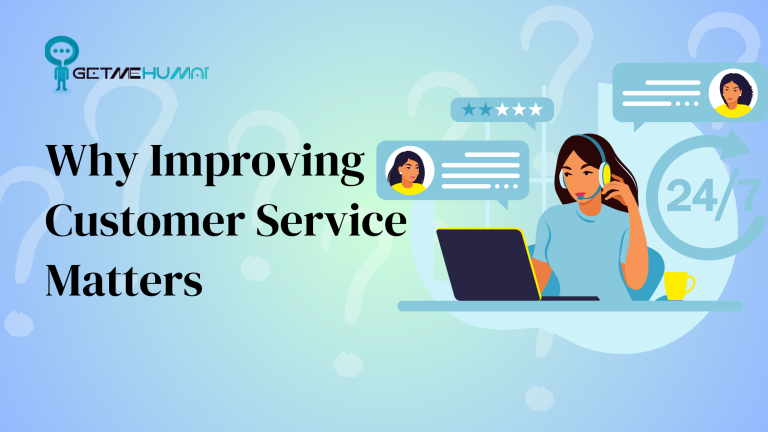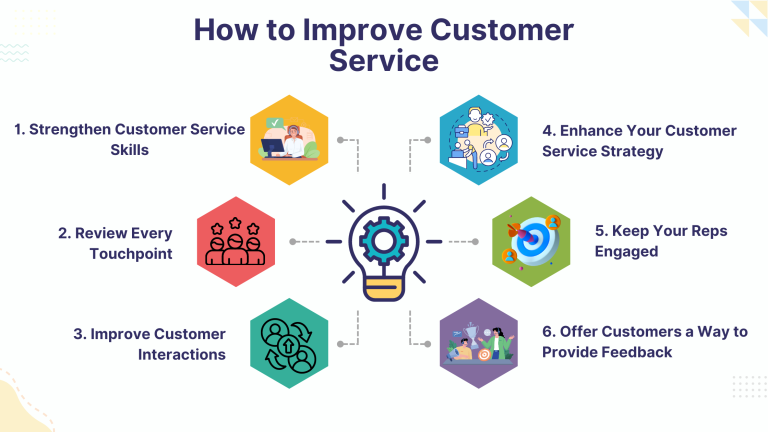The Ultimate Guide to Transforming Customer Service Excellence

Improving customer relationships starts with a simple but often overlooked solution: enhancing customer service. No matter how excellent your product is or how skilled your employees are, what customers remember most is their interaction with your company.
At its core, your customer service team represents your business, and customer experience (CX) heavily depends on the quality and skills of the support they provide. Even if a company already has solid customer relationships, the smartest companies constantly ask, “What defines good customer support?” The answer is simple—it’s about truly listening to your customers and meeting their needs. Without continuous improvement in customer service, your relationships will likely suffer.
What Is Good Customer Service?
Good customer service fuels a positive customer experience (CX). It begins with empathy and adaptability—meeting customers where they are, emotionally and otherwise. Every customer interaction leaves a lasting impression, and a positive experience leads to repeat business and loyalty.
Why Improving Customer Service Matters

On the other hand, negative experiences can erode trust in your product or brand. That’s the opposite of good customer service, which fosters loyalty and, ultimately, brand equity. As you build loyalty, you also build trust, which allows you to differentiate yourself from competitors and sell products at a premium.
Providing excellent customer services enhances brand equity, which enables you to meet customer needs effectively. When your service is top-notch, customers are willing to pay more because they trust your brand.
Read More: Key Principles of Excellent Customer Service
How to Improve Customer Service
Negative customer experiences can be turned around, or better yet, avoided. Here are a few tips to help you better serve your customers:

1. Strengthen Customer Service Skills
Ensure your customer service team possesses the right skills to meet your customers’ needs. While CRM software is helpful, no amount of technology can replace essential skills like:
- Empathy: AI has its place in customer support, but nothing can replace the human touch. When a customer is upset, patience and understanding go a long way. Let them speak without interruption, and repeat their concerns to show you’re listening.
- Adaptability: Every customer is different. A good customer service rep can read the customer’s mood and adjust accordingly. Flexibility and a willingness to learn ensure continuous improvement.
- Clear Communication: Always make sure customers understand you fully. Avoid confusion by being clear, positive, and transparent. Never end a conversation without confirming the customer is satisfied with the outcome.
- Work Ethic: A strong work ethic shows customers you’re reliable and care about their issues. It’s the foundation of trust, loyalty, and brand ambassadorship.
- Knowledge: Keep your team updated on the latest product developments to exceed customer expectations. Customers appreciate honesty, so if you don’t know something, admit it and find someone who does.
2. Review Every Touchpoint
To avoid friction, ensure your customer service is consistently strong throughout the entire customer journey. Pay special attention to key touchpoints where customers interact with your brand before, during, and after a purchase. Every step matters, and a single bad experience can damage your reputation.
3. Improve Customer Interactions
Even if your staff is skilled, they must relate well to your customers. Here’s how:
- Find Common Ground: Encourage reps to connect with customers by asking about their day or making small talk. These small personal touches make interactions less transactional and more human.
- Active Listening: Rephrase and clarify what the customer says to show you’re fully engaged. By acknowledging their feelings, you demonstrate empathy and understanding.
- Own Mistakes: Admitting errors quickly builds trust and helps maintain confidence in your brand. Taking responsibility allows you to manage the situation and refocus on solving the problem.
- Follow Up: After resolving an issue, check in to ensure the customer remains satisfied. A follow-up email or feedback survey is a simple yet effective way to stay connected and show you care.
4. Enhance Your Customer Service Strategy
Make proactive customer service a priority by ensuring your customers are happy before they encounter problems.
- Personalize Service: Customers want real people, not bots. Use social media to respond directly to their questions and concerns. Post team bios to showcase the human side of your business.
- Cater to Your Customers: Assign specific reps to certain customers for a more personalized experience. Offer special benefits to loyal customers to show you value their support.
- Create Communities: Foster a sense of community among your customers through webinars, social media, and in-person events. You’ll not only teach them but also learn from their feedback.
5. Keep Your Reps Engaged
The best customer service skills won’t make a difference if your reps aren’t motivated. Engage your employees by providing a positive work environment, opportunities for advancement, and regular feedback. Happy, engaged employees are more likely to provide excellent customer support.
6. Offer Customers a Way to Provide Feedback
Create accessible ways for customers to provide feedback, whether through surveys, feedback forms, or social media. Gathering feedback allows you to address issues quickly and prevent dissatisfied customers from spreading their frustration publicly.
- Customer Satisfaction Survey: Asking meaningful questions through a CSAT survey gives you insights into your customers’ experiences.
- Net Promoter Score (NPS): NPS measures customer opinions and helps gauge loyalty by asking how likely customers are to recommend your business.
By consistently working on these areas, you’ll build strong customer relationships and deliver excellent service that will set you apart from the competition.
Conclusion
Transforming customer service excellence isn’t an overnight process, but with a clear strategy and a commitment to continuous improvement, your business can achieve it. By focusing on customer needs, empowering your team, leveraging technology, and fostering a customer-centric culture, you’ll create a seamless, personalized, and memorable experience that sets your brand apart. The key is to keep evolving with your customers’ expectations, ensuring that every interaction leaves a lasting positive impression.
